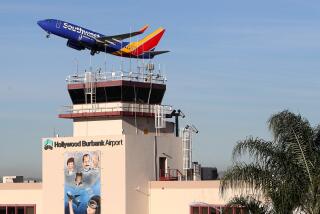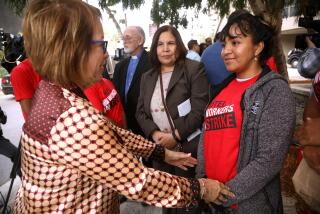Airport Chief Questions 2 Minority Pacts
- Share via
The chief of the city’s Department of Airports has ordered a review of two multimillion-dollar food service contracts whose partners include several politically well-connected minority leaders, among them Los Angeles Urban League President John Mack and church leader H. H. Brookins.
The review will center on whether concession agreements, awarded under a program to increase participation of disadvantaged minorities and women in city contracts, provide for the minority partners a clearly defined, hands-on role in the running of the concessions. Such a role is required by both city and federal government contract guidelines.
“We’re asking what have they done, what are their plans for the future and how have they met the (minority participation) objectives,” said Clifton Moore, the department’s executive director.
The agreements are between the city and Host International Inc., a subsidiary of the Marriott Corp., and eight minority partners. The contracts cover operations of cafeterias and other food services at Los Angeles and Ontario international airports. According to public records and interviews with Host and others, the minority participants receive a share of the profits.
The business activity of the minority partners varies from attending board meetings to recruiting employees, according to interviews with participants.
Mack said he does not spend a lot of time involved with the food service concessions. He said it was management’s responsibility to handle employee and payroll matters. Brookins was not available for comment.
Evelyn Martinez-Zapata, another of the minority partners, said: “(Host) told us they were looking for a group to advise their management committee. This was not ever intended to be a hands-on type of management.”
Airport Commissioner Johnnie L. Cochran Jr., who has sought more minority and women’s participation in airport concession partnerships, said of the cafeteria contract: “My idea is there needs to be hands-on participation. I think as part of the deal (the minority partners) should actually be running the food operation.”
The move to review the food and beverage contracts at city-owned Los Angeles International and Ontario airports comes after news reports this week about contracts for gift shop concessions with other minority and women partners, including the wife of House Ethics Committee Chairman Julian Dixon (D-Los Angeles). Dixon, who has denied any improprieties, reported that his wife collected at least $150,000 over the last two years for her participation in a joint venture partnership with Duty Free Shoppers Group Ltd. Partnership. Betty Dixon acknowledged in an interview with The Times that she had limited involvement in the operation and had invested no more than $15,000 in the business.
On Wednesday, Moore asked Duty Free for a written explanation of what functions the minority partners perform in the gift shops and news concession operations. Moore said that Betty Dixon’s portrayal of her responsibilities in the airport concessions does “not seem to be consistent” with the minority participation program approved by the department.
As for the cafeteria concessions, The Times has learned that airport officials, including Moore, had some reservations about the contracts involving the minority partners even as the contracts were being renewed, without competitive bidding, by the Airport Commission in 1987 and 1988.
Eager to renew its food and beverage contracts at the two city-owned airports, Host sought out women and minority partners to increase its chances.
Internal memos show that Barbara Williams, who heads the airport’s minority business program, began warning commissioners and managers at the time that proposed contracts did not clearly define a business role for the minority partners, as required by city and federal guidelines. Federal guidelines apply because the airport received federal funds.
U.S. Transportation Department lawyer Robert Ashby told The Times on Thursday that federal rules require minority participants to be more than passive investors or merely attend board of directors meetings.
“The individual has to be there (on the job site) a fair amount of time, has to talk to the people to whom jobs are delegated, has to be performing as what a reasonable person would think a manager in touch with a business should be doing,” Ashby said.
The minority partners brought into the cafeteria contracts by Host include Mack, a longtime supporter of Mayor Tom Bradley; Brookins, a politically active bishop in the African Methodist Episcopal Church who helped launched Bradley’s career; Martinez-Zapata, a former aide to Bradley and fund-raiser for Councilwoman Gloria Molina; and attorney and restaurateur Andy M. Camacho, a close political ally of Councilman Richard Alatorre.
The other partners are: Ernest M. Camacho, a Pasadena businessman and brother of Andy Camacho; Earl E. Gales Jr., a partner in Jenkins-Gales-Martinez Inc., a Los Angeles architectural and engineering firm; Treva D. Metoyer, a Lynwood businesswoman, and Luis C. Valenzuela, a real estate developer and fund-raiser for Molina, Alatorre and other Eastside politicians.
In 1987, Host formed--and the Airport Commission approved--the first joint venture to boost minority involvement in its $4.4-million-a-year concession contract at the Ontario airport. That group involved all of the partners except Brookins and Mack. The two men were added in 1988, when Host received commission approval for a similar arrangement to share in $49 million in annual cafeteria sales at Los Angeles airport.
According to airport records and interviews with Host and four of the eight partners, the minorities were not required to put any cash into the venture. They each received a varying share of the concession business and they are guaranteed payments from the profits 13 times a year. These payments range from $13,000 a year (to Mack) to more than $65,000 a year (to Brookins), according to Host. The payments are expected to increase as sales rise. The concessions at the two airports grossed more than $53 million last year.
The contracts provide for minority partners to get minimum payments or a percentage of the profits, whichever is larger, according to Mack.
The minority partners attend quarterly management meetings primarily to listen to reports by Host executives on the food concessions business and recruit minority vendors and employees to Host, according to interviews and public documents.
The time the partners have devoted to the business varies. Mack said that he spends “maybe a couple of hours a month” on the business, attending meetings, making phone calls and writing letters. “Clearly, it has not consumed an inordinate amount of my time,” he said.
Since Brookins moved to Washington last summer he has attended few management meetings, two partners said.
However, Gales said he works up to 40 hours a month on the concession business, mainly making telephone calls and recruiting potential employees.
The airport’s Williams said she expressed her concerns about the lack of a direct participation plan to her superiors as the Host contracts came up for renewal. But Gary Netzer, the senior assistant city attorney in charge of airports, said the degree of participation was a policy decision for the Airport Commission to make.
Other airport managers, including Moore, maintained in interviews that they shared some of Williams’ concerns. Moore said the issue was “sort of a value judgment” for the Airport Commission to decide.
Cochran said those concerns were never expressed to the commission.
One knowledgeable airport source, who asked not to be identified, said some airport officials suppressed their concerns because of the “sensitivity” of Anglo-led airport management criticizing a business arrangement designed to increase minority participation.
On Wednesday, the mayor’s office said it also shares concerns that the contracts lack meaningful minority participation and may not meet city guidelines. “Somebody made a mistake,” said Deputy Mayor Michael Gage, who added that the minority partners should be involved in the concession operations.
In its role as overseer of all city minority-contracting programs, the mayor’s office was making inquiries about the status of the contracts, records show. One memo describes the office’s concerns that it was not being kept fully apprised. However, there is no indication that Bradley himself intervened in any way.
Mack said he does not believe that hands-on involvement is necessary to learn the business.
“I’m not hiring or firing anybody,” Mack said. “I’m not doing the payroll. That is what we have (Host) management to do. . . . It may not be the best approach, but it is a beginning step in the direction of trying to correct some past inequities.”
Times staff writers Elizabeth Mann, Joel Sappell, Henry Weinstein and Robert Welkos contributed to this report.
More to Read
Sign up for Essential California
The most important California stories and recommendations in your inbox every morning.
You may occasionally receive promotional content from the Los Angeles Times.










